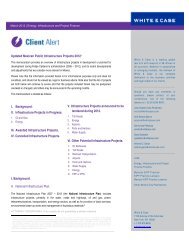Mexican Legal Framework of Business Insolvency - White & Case
Mexican Legal Framework of Business Insolvency - White & Case
Mexican Legal Framework of Business Insolvency - White & Case
Create successful ePaper yourself
Turn your PDF publications into a flip-book with our unique Google optimized e-Paper software.
60<br />
to an asset against payment <strong>of</strong> the price, one <strong>of</strong> the parties pays to the other the<br />
difference in value <strong>of</strong> the underlying asset. Goldschmidt (2008) 39 provides more<br />
insight into the concept <strong>of</strong> contracts for difference.<br />
A derivative financial transaction, pursuant to the <strong>Insolvency</strong> Law, is that in which<br />
the parties are obligated to pay money or to surrender other property, which<br />
[are referenced to] an underlying asset or market value [LCM 104]. There is no<br />
substantive difference between this legal concept <strong>of</strong> derivative financial transaction<br />
and that <strong>of</strong> contracts for difference.<br />
The concept also includes those agreements which Banco de México determines<br />
[as such] through rules <strong>of</strong> general application [LCM 104]. Banco de México is<br />
entrusted, among others, to promote the healthy development <strong>of</strong> the financial<br />
system and propitiate the correct functioning <strong>of</strong> the payment systems [LBM 2]. As<br />
such, Banco de México has issued general rules 40 for derivative financial transactions<br />
applicable to financial intermediaries (commercial banks, broker dealers, investment<br />
companies and pension fund investment companies). These rules recognize the<br />
following transactions as derivative transactions: (1) futures; (2) options; (3) swaps;<br />
and (4) credit derivatives. The terms are defined as follows: 41<br />
■ ■ Futures:<br />
transactions for the sale or the purchase <strong>of</strong> an underlying asset<br />
or index, in which the parties agree that the obligations shall be met at the<br />
agreed-upon price and at a date that is subsequent to that <strong>of</strong> contracting.<br />
■ ■ Options:<br />
transactions in which the holder, through the payment <strong>of</strong> a premium<br />
to the writer, acquires the right, but not the obligation, to buy or sell an<br />
underlying asset or index at an agreed-upon price, on one or more dates, and<br />
the writer is obligated to sell or buy, as the case may be, such underlying asset<br />
or index.<br />
39 P. 253.<br />
40 Circular 4/2006 and Circular 1/2002.<br />
41<br />
Circular 4/2006.
















